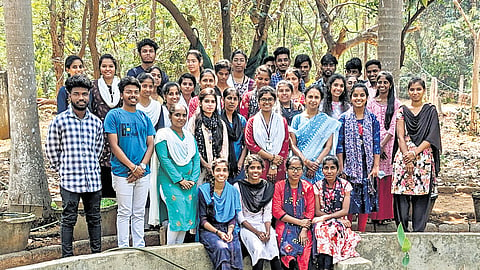

VISAKHAPATNAM: Within the premises of Rani Chandramani Devi Government Hospital’s three-acre expanse lies the Biodiversity Park, a testament to the dedication of the Dolphin Nature Conservation Society (DNCS). Established on March 5, 2001, DNCS has been fervently working towards nurturing a love for nature and conservation, particularly among the younger generation.
The park, inaugurated on June 5, 2002, has evolved into a vibrant botanical garden, showcasing over 2,000 species of plants, 60 species of birds, and 105 species of butterflies. Within its modest three-acre expanse, the park simulates various ecosystems, including forests, deserts, conifers, and ponds, offering visitors a glimpse into the rich biodiversity of the region.
It has more than 300 rare and endangered plant species. The park comprises 10 sections, including medicinal or herbal orchids, carnivorous plants, cacti and succulents, aquatic plants, plants of Jurassic times, sacred groves, ornamental palms, and bamboo groves, among others.
After 22 years of tireless efforts, the park now extends its mission beyond conservation to education, recognising the need to impart practical knowledge to the younger generation.
Mantha Ram Murty, a marine biologist and former professor at Andhra University, who co-founded DNCS, emphasises the importance of hands-on learning. “We provide practical training to interns, covering the importance of these plants, propagation techniques, utilisation, and, if necessary, consumption. This equips them for the future, enabling them to establish their own nurseries, engage in part-time business ventures, or potentially be absorbed as consultants in various organisations,” he explained.
Through internship training programmes focusing on topics such as herbal gardens, biodiversity, botanical surveys, and plant nursery techniques, the park aims to equip students with the skills necessary for conservation efforts.
Underscoring the significance of experiential learning, Murty felt, “It cannot be taught just through books but needs experimental knowledge as well.” The park serves not only as a sanctuary for rare and endangered plants but also as a gene bank, housing both endemic and exotic species. Its educational initiatives have garnered recognition, with the park receiving three State-level awards for its conservation and education programmes.
Over the years, the park has welcomed numerous schools and colleges, engaging over 1 lakh students in its training programmes.
The society aims to promote appreciation of nature and conservation, particularly among youngsters. Its significant activities include research, documentation, conservation efforts, and awareness campaign focusing on Olive Ridley sea turtles, intertidal rocky shore fauna and flora of the Visakhapatnam coast, and butterflies of the Eastern Ghats.